“Opening Bitef with none other than the play Mount Olympus, which is currently one of the most famous in the world, truly reaffirms what Bitef is and its grandeur in every sense of the word.”
Although it only starts on 22 September, talks about the 51st Bitef began in the second half of June when only a part of its upcoming programme was announced. This suggests that this year’s Bitef will have the glamour that made it one of the most relevant theatre events in the world.
Bitef, or the Belgrade International Theater Festival of New Trends by its full name, was founded on 26 December 1967 as a permanent event of special importance to the City of Belgrade. The founders, art directors and selectors of Bitef were Mira Trailović and Jovan Ćirilov. Thanks to them and others who carried out of their idea, Belgrade has since become a name in world theater.Already in its first year Bitef was able to realize its founding idea and bring new trends in theater and extreme avant-garde theater developments such as Living Theater (the play “Antigone”) and the theater of Jerzy Grotowski.
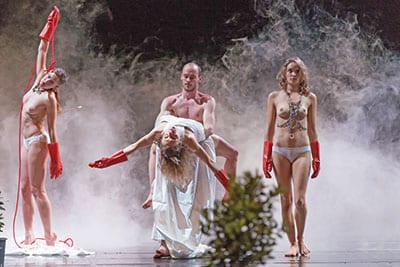
In that decade Belgrade was on the border between the ideologically divided Western and Eastern blocs, which made Bitef a place where artists from both blocs could meet and exchange experiences, a truly unique place in the world. On Bitef’s tenth anniversary during the Cold War, great western theater critics, writers, directors, and theater managers came to Belgrade to see the Taganka Theater from Moscow and Yuri Lyubimov, a director from the other side of the iron curtain, whose daring shows they could otherwise only hear about.
In the revolutionary 1960s and 1970s Belgrade saw some of the bravest stage experiments that led to the deconstruction of dramatic form, shows of new trends at permanent theaters, and performances of traditional oriental theater. During the next two decades Bitef introduced its audience to the highest achievements of postmodern theater and dance. It did not falter in the promotion of world performers even in times of political and economic crisis and embargo. In this century, in line with changes on the world theater scene, Bitef has shown performances of post-drama non-verbal and cyber theater.
For the sake of illustration, we could mention just a few of the hundreds of theater artists who are part of Bitef’s 50-year history: Eugene Ionesco, Claus Peymann, Eugenio Barba, La mamma, Ingmar Bergman, Peter Stein, Georgij Paro, Roberto Ciulli, Peter Brook, Dušan Jovanović, Paolo Magelli, Robert Wilson, Andrzej Wajda, Ljubiša Ristić, Tadeusz Kantor, Dejan Mijač, Tomaž Pandur, Yuri Lyubimov, Samuel Beckett, Thomas Ostermeier…
From 22 to 30 September in Belgrade, Bitef will see seven plays performed under the slogan Epic Trip lasting for more than 40 hours. They are the following: Quizoola performed by Forced Entertainment from Great Britain, Mount Olympus by Troubleyn from Belgium, Bible, the First Attempt by the Slovenian National Theatre Drama from Ljubljana, Kingdom of Heaven (working title) coproduced by the National Theatre in Belgrade and the Serbian Bitef Theatre, Snow performed by Thalia Theatre from Hamburg, Germany, Hearing by Mehr Theatre Group from Tehran, Iran, and The Extermination by Konzert Theater from Bern, Switzerland.
Last year, opening the 50th Bitef, Bob Wilson, perhaps the most famous theatre director in the world, revealed a fact that Bitef was one of the co-producers of his play, at a time when the US would not give anything for his work
Plays participating in the 51st Bitef, which have attracted such media attention, have been selected by Bitef Artistic Director Ivan Medenica.
The slogan ‘Epic Trip’ has been inspired by the plays, since most of them have a narrative character. How will the plays you’ve chosen fit in these fast times we live in, in times with no patience for a long duration?
The slogan Epic Trip is multifaceted. Epic refers to the composition that comes from epics and myths, because the entire Greek mythology is at the core of several plays, as are biblical texts and Serbian epic literature, while the Iranian play Hearing personally reminds me of One Thousand and One Nights, a typically Persian tradition of narration. The first meaning of the slogan Epic trip is therefore related to the content of the plays, while the second is related to the tradition of narration. The third meaning of the word epic is epic duration.
 Mount Olympus in particular lasts 24 hours, which makes it a curiosity in itself, and the play Quizoola performed by the famous British troupe Forced Entertainment also lasts 24 hours. However, we have chosen the opportunity offered by the troupe – to watch a shortened version of a mere six hours! Regarding the explanation of the word Trip in our slogan, it means a journey to ancient civilisations on which the entire world civilisation is based, which is very important to Bitef, because Bitef is an international festival that cannot limit itself to a western or European cultural context. Of course, the English word trip has its colloquial meanings related to a specific state of mind, to hallucination, to a special psychophysical surrender, which really is the effect that these plays of long duration create. They almost physiologically bring you to a state of consciousness where you may become more ready, maybe because of the fatigue, to let yourself go and abandon your everyday routine. Regarding our life in the time of fast forms, short, fast changes of rhythm, external attractions, the mere idea that you would allow yourself to spend 24 hours of your life in a theatre, in the most literal sense of the word, that you would allow yourself a specific exchange that will happen in those circumstances, an energy exchange, emotional, intellectual, spiritual and even physical exchange with the audience around you, and most of all with the actors on the stage, is fascinating.
Mount Olympus in particular lasts 24 hours, which makes it a curiosity in itself, and the play Quizoola performed by the famous British troupe Forced Entertainment also lasts 24 hours. However, we have chosen the opportunity offered by the troupe – to watch a shortened version of a mere six hours! Regarding the explanation of the word Trip in our slogan, it means a journey to ancient civilisations on which the entire world civilisation is based, which is very important to Bitef, because Bitef is an international festival that cannot limit itself to a western or European cultural context. Of course, the English word trip has its colloquial meanings related to a specific state of mind, to hallucination, to a special psychophysical surrender, which really is the effect that these plays of long duration create. They almost physiologically bring you to a state of consciousness where you may become more ready, maybe because of the fatigue, to let yourself go and abandon your everyday routine. Regarding our life in the time of fast forms, short, fast changes of rhythm, external attractions, the mere idea that you would allow yourself to spend 24 hours of your life in a theatre, in the most literal sense of the word, that you would allow yourself a specific exchange that will happen in those circumstances, an energy exchange, emotional, intellectual, spiritual and even physical exchange with the audience around you, and most of all with the actors on the stage, is fascinating.
The mere idea that you would allow yourself to spend 24 hours of your life in a theatre, in the most literal sense of the word, that you would allow yourself a specific exchange that will happen in those circumstances, an energy exchange, emotional, intellectual, spiritual and even physical exchange with the audience around you
The British play Quizoola, the programme’s prologue, had its premiere several decades ago, which does not fit with Bitef’s tendency to show new pieces. Why have you invited it?
It premiered in 1996, and there are several reasons why it found its place on Bitef’s programme, exactly on the introductory day. This play is a prologue in itself – it is one of the first long-duration performances, so we wanted to pay homage to it. The British troupe Forced Entertainment typically deals with long-duration performances, and what is characteristic for this play is that it treats the term ‘duration’ from another aspect as well – not only in terms of the number of hours but also in terms of remaining on the programme – for 21 years!
During this period, it has undergone some changes, it has the structure of an endless quiz in the form of stand-up performances lasting around 20 minutes each, a quiz of knowledge of a certain concept. The play is constantly updated, new topics relevant to the modern world are introduced – it is like a well-made machine that can last for years and is constantly remodelled. It features phenomenal actors and is very much based on their improvisation.
It has been announced that Mount Olympus is rarely performed…
Yes, because it is both physically and psychologically very demanding for the performers; as far as I’ve heard, they’ve only played it in a dozen cities. They will arrive in Belgrade five days earlier to prepare for the performance – the rehearsal lasts 12 hours. There are actors, dancers, performance artists, the cast is international. The play is like the Tower of Babel – it features a number of languages, such as Flemish, French, English, Italian, Croatian etc.
It could be said that the participation of Mount Olympus at Bitef since it is rarely performed and is one of the most attractive plays in the world, proves Bitef’s reputation among a global theatre public.
I can only agree, and say that it is an honour that we could get this troupe to come, given our modest funds – they did us favour with their prices. The mere fact that the play lasts 24 hours, that the ensemble lives in Belgrade for five days before the performance and that the rehearsals last 12 hours – this is all expensive, and it was a great production challenge for our team. But for the sake of Bitef’s reputation, they will be performing here at their lowest price. What is more, opening Bitef with none other than this play truly reaffirms what Bitef is, and its grandeur in every sense of the word.
At the same time, at the end of the festival, we will see two plays by young German director Ersan Mondtag. He was born in Germany, but has Turkish origins and comes from the Turkish community. Ersan is 29 years old and already recognised in German-speaking countries. He is coming here with his plays from Hamburg and Bern, but he is still not famous in an international context. This will be Mondtag’s first international performance, and if these two plays are successful, as I am sure they will be, his career will start from Bitef.
Bitef traditionally discovers new directors, troupes…
This has been typical throughout Bitef’s history, with the most famous names Bitef launched being Grotowski, Bob Wilson, and the American troupe The Living Theatre. Last year, opening the 50th Bitef, Bob Wilson, perhaps the most famous theatre director in the world, revealed a fact I did not know: that Bitef was one of the co-producers of his play, at a time when the United States would not give anything for his work. This is why I am glad that, by affirming young director Mondtag who I strongly believe will have a global career, Bitef continues its traditional mission.
Mondtag comes from the Turkish community in Germany. The fact that he succeeded in German theatre while belonging to a national minority demonstrates the openness of both German society and theatre.
Given the historical circumstances, German theatre became multicultural relatively late compared to, for example, French or English theatres that have been that way since the 1970s, because Germany does not have a history of colonisation.
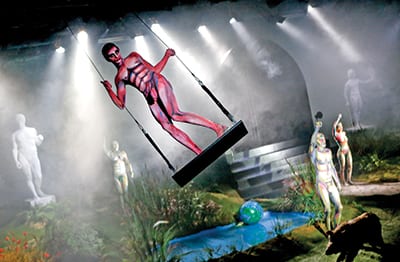
On the other hand, while Western Europe was facing the demons of its colonial past, Germany had to face its own demons, so their theatre became multicultural only some twenty years ago. We showed this at the 50th Bitef with the choice of German plays – they both dealt with African topics and had African artists.
This year, we are showing German theatre culture since one play is from Hamburg and the other from Bern, which lies in the German-speaking part of Switzerland, both represented by a member of the Turkish community. There is a theatre in Berlin called ‘Maxim Gorky’, whose director is of Turkish origin, and whose ensemble has many artists of Turkish origin and from the former Yugoslavia. Let me just remind you, their play dealing with the wars in the former Yugoslavia was at Bitef three years ago. I am glad that, for two years in a row, Bitef has been pointing to the incorporation of other cultures into German culture.
Slovenian director Jernej Lorenci is also participating with two plays. What is the topic of the play with the working title the Kingdom of Heaven, Bitef’s co-production with the National Theatre? What we know so far is that it is based on Serbian epic poems and that the main characters are Marko Kraljević and Miloš Obilić.
Several preliminary rehearsals were held in June, while intensive preparations began on 20 August. The play is based on various materials from Serbian epic literature that were revised, modified and adapted through cooperation between the authors and the actors.
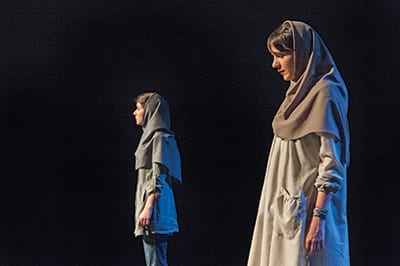
What I know is that Lorenci is primarily interested in an archetypal situation that is more widely spread, but is also typical for Serbian tradition – the archetypal dualism between hero and victim. What is typical for our epics is that we are either heroes or victims, there is not a single identity in between. That is the avoidance of responsibility for everyday life. In this sense, the play has a political note even though it deals with universal topics.
The title, even though it is a working one, has already identified the play, it has an ironic undertone. Have its authors considered this?
Lorenci is aware that the phrase kingdom of heaven has been politically and ideologically exploited, and he will deal with traps of this kind. At the same time, he does not want to make a play that will only strive to avoid falling into those traps, because he believes that in a philosophical sense, if we disregard those ideological misuses, the philosophical dilemma between a life in the ideals of the kingdom of heaven and the compromises the kingdom of earth requires is highly topical for all of us. For the kingdom of heaven has all but disappeared. This society is losing faith in its ideals so, personally, I find it interesting to know how the play will advocate the kingdom of heaven while avoiding the traps of misuse the phrase carries.
What is typical for our epics is that we are either heroes or victims, there is not a single identity in between. That is avoidance of responsibility for everyday life
The play Hearing by the young Iranian director Amir Reza Koohestani deals with the status of women in modern Iran, which in itself shows the change in public attitude towards women in this country. Could you comment on this?
I saw the play at the Avignon festival. It has been performed at many big festivals, and its director Koohestani – young, but already recognised and famous – lives between Tehran and Europe, so I am not sure how much this play, however one hundred per cent Iranian it is in terms of culture, language and everything else, really represents the main trends of Iranian theatre and how much Iranian theatre deals with taboo political issues. But since we have a comparative experience of Iranian film and so we know that in Iran it is enough for women to just cover their head slightly, it seems to me that perhaps this play, at least from our western perspective, speaks about a more open attitude towards those issues.
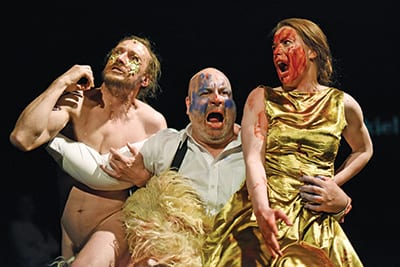
A comparative experience may also be found in the following example: last year, we focused on Africa, specifically in Nigeria, as the laureate at the International Congress of Theatre Critics was Nigerian author Femi Osofisan. So this year I went to Nigeria to their biggest theatre festival where I encountered an interesting phenomenon: their theatre deals precisely with the topics that are taboo in society. I saw several plays on women’s rights, on LGBT topics, and homosexuality is forbidden in Nigeria. In a country where homosexuality is outlawed, the theatre deals with exactly those forbidden topics. Of course, I am not making a comparison between Nigeria and Iran, I am only talking about the theatre’s need to speak of topics that are not to be spoken of.
In addition, the Iranian play Hearing has an extremely modern expression, and deals with a current social topic, but also reminisces about one of the most significant and oldest cultures – Persian. While I was watching the play, it reminded me of Scheherazade and her stories, because the play is structured around opposing stories on the same topic, searching for the truth regarding the issue of the status of women.
This year I went to Nigeria to their biggest theatre festival where I encountered an interesting phenomenon: their theatre deals precisely with the topics that are taboo in society
How is Bitef’s cooperation with foreign cultural centres in Serbia?
Very good, both with cultural centres and with embassies. We cooperate traditionally well with the Goethe Institute and are especially grateful to them this year for providing us with the necessary sum for the German play, despite the fact that we selected it after deadlines that suited them. They were remarkably patient with us, and we are grateful.
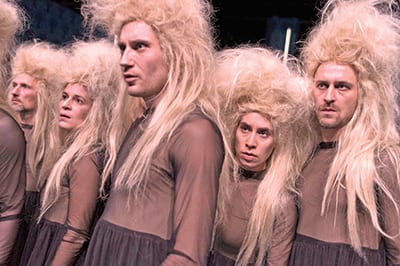
The German Embassy has shown particular interest in the presence of the German play, as part of this year’s wider presentation of German culture in Serbia – we know that Germany is the honorary guest of this year’s Book Fair. This year we did not cooperate with the French Institute, with which we have a long-standing tradition of cooperation, because we have not selected any plays from France. The Swiss Embassy helped us bring the Swiss play to Bitef, and we are very grateful for that.
Are you already thinking about the 52nd Bitef?
Yes. For example, in late July we went to Venice to the International Theatre Festival to see an Estonian play I had heard a lot about. Estonian culture has never been featured at Bitef, and whether we have chosen it you will find out this time next year.